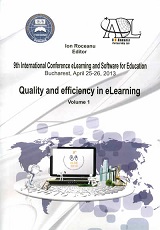CHANGES AND EVOLUTION IN DISTANCE EDUCATION – FROM MAILING LETTERS TO WEB-BASED LEARNING
CHANGES AND EVOLUTION IN DISTANCE EDUCATION – FROM MAILING LETTERS TO WEB-BASED LEARNING
Author(s): Andrei GăitanaruSubject(s): Education
Published by: Carol I National Defence University Publishing House
Keywords: distance education; e-learning; online education; web-based learning; ICT
Summary/Abstract: New paradigms were born in the fields of scientific research and technological development, in the way of doing business, in the nature of work, and in business management. Classic education involves two types of actors: teachers and students. The information technology has changed this, proposing basically a new communicational paradigm, resizing the role of classical actors and involving in this process also IT experts, programmers and media technicians. Education was not left aside by the technological phenomenon, which brought about essential changes that created new methods, models and paradigms in the postmodern education. Distance learning is not an invention of modern times. This type of study was born very shortly after the appearance of written language, but has only grown stronger since the modern era. In this context, the paper aims to put some light on the concept of e-learning, by presenting its evolution, some of the main features, advantages and recommended requirements for an effective approach of distance education. The development, during the recent years, of the information and communication technology (ICT) has had a profound impact on the conduct of everyday activities in all aspects of the society. Thus, new paradigms were born in the fields of scientific research and technological development, in the way of doing business, in the nature of work, and in business management. Education, as an activity essential to the societal development, could not be left aside the technological phenomenon, which brought about essential changes that created new methods, models and paradigms in the postmodern education.
Journal: Conference proceedings of »eLearning and Software for Education« (eLSE)
- Issue Year: 9/2013
- Issue No: 01
- Page Range: 416-421
- Page Count: 6
- Language: English

